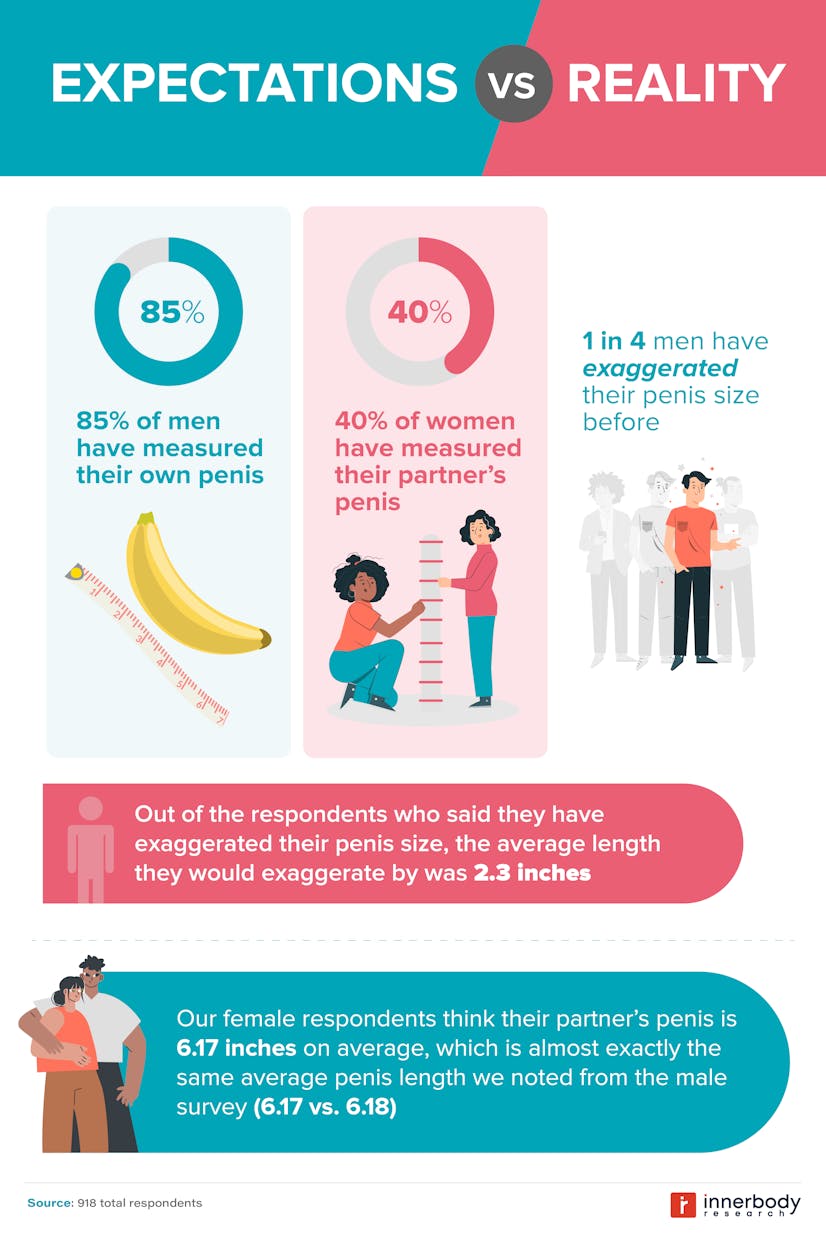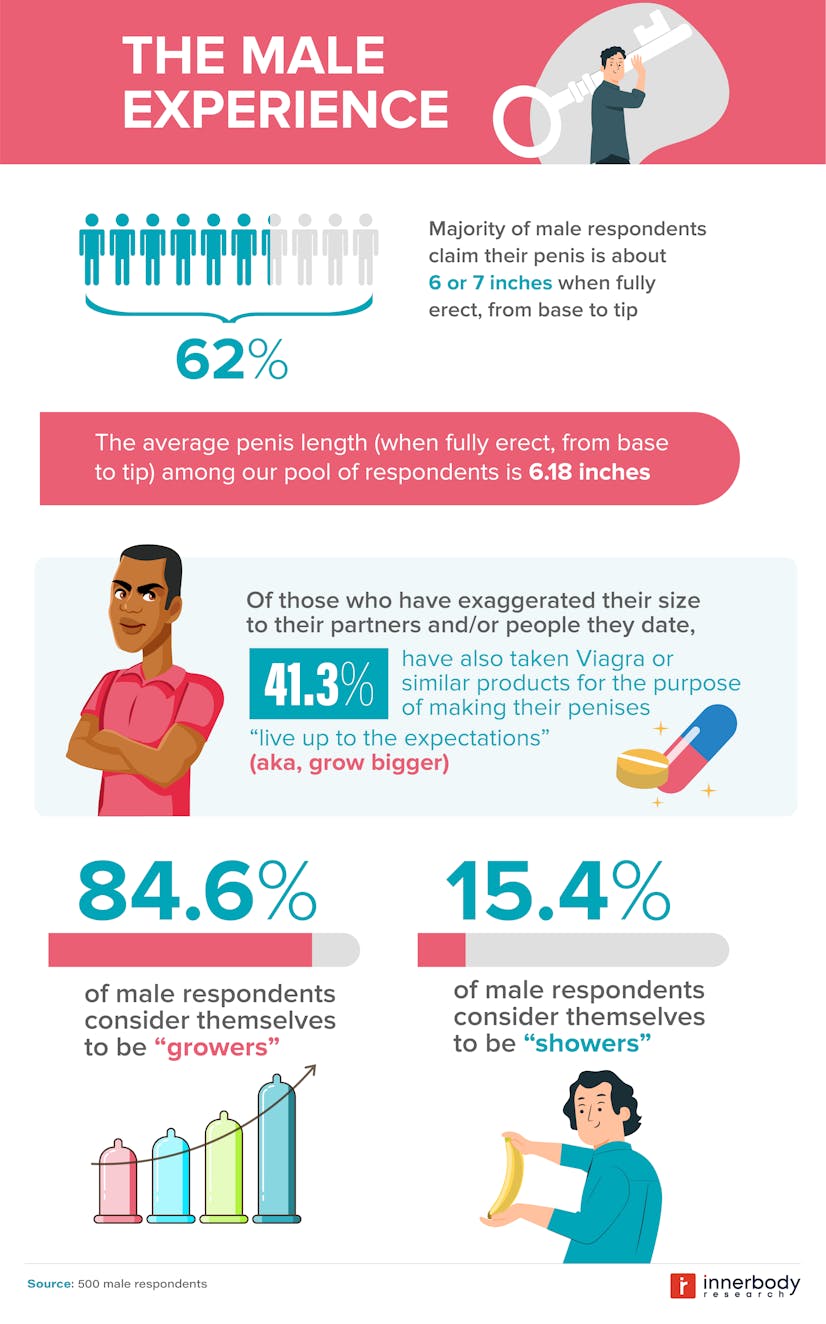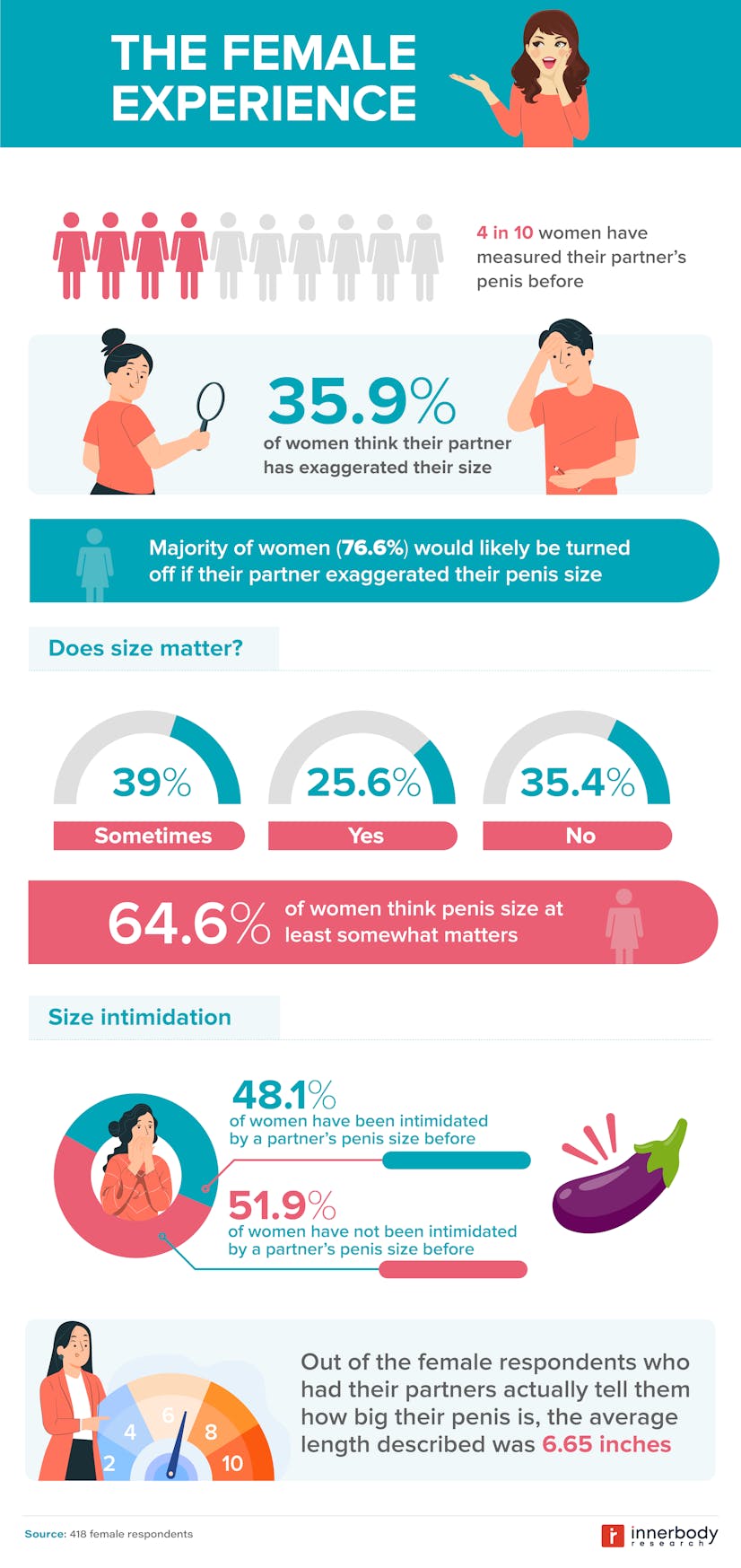Does the package match the description?
74.8% of men claim they’ve never exaggerated the size of their penis, but 35.9% of women question that assertion.

Penis size is something that men have been sensitive about as long as there’s been conversation around it. The standard pushed in modern times is that bigger penises are always better. While only 0.6% of men have a clinically significant micropenis (less than 2.8 inches long), many men feel insignificant or insufficient for their partners. That might be because of beauty standards, cultural shaming and mockery, or just plain misinformation. No matter the cause, some men respond to negative pressures by exaggerating their size.
But how often do men lie about their penis size, and, more importantly, why do men feel the need to lie? We surveyed 918 people to find out.
Jump to:
Key takeaways
- Three-quarters (74.8%) of men say they’ve never exaggerated their penis size to a partner.
- Those who have exaggerated add an average of 2.3 inches to their measured length.
- Three-quarters (76.6%) of women say that learning a partner has exaggerated their penis size is a turn-off.
- Within our survey, the average self-reported penis size is about 6.2 inches — verified by both men and women.
- 41.3% of men have taken Viagra or other pharmaceuticals to try and live up to size expectations.
Survey overview
Men’s penis sizes can make or break their self-esteem. Those who consider themselves smaller are much more likely to struggle with self-confidence and self-worth. Studies have found that men with high social desirability scores — those who want most to be accepted by others — are most likely to over-report their penis size. In creating and performing this survey (and sharing our results with you), we hoped to illuminate a piece of men’s psychological and sexual health that often goes misrepresented.
In two separate surveys, we asked 500 men and 418 women about their perceptions of penis size. All participants are cisgender and are currently in heterosexual relationships or have been in the past. We wanted to know:
- How big they think it is (and how big they say it is)
- If they’ve previously measured it
- Whether or not they think it matters
- What (if anything) they’ve done to change its size
Specifically, we focused on the phenomenon of size exaggerations to understand what else might compel men to overestimate their penis size for a partner.
Average size vs. exaggerated size

Photo by Innerbody Research
To start with, we asked men if they’d ever measured their penis before. This report gave us the groundwork to determine whether or not they had a realistic sense of how large it is (because six inches may be larger or smaller than you expect it to be). Unsurprisingly, most men — 85.6% — reported previously measuring their members. 40% of women also reported measuring their partner’s penis, meaning that 60% of women rely solely on what their partner says and their observations and intuition.
Only 25.2% of men were willing to admit that they’ve exaggerated their penis size to a partner. On average, they added 2.3 inches to their measured size. This is about on par with what other surveys have found.
Most men (62%) who’ve measured their penises say it’s between six and seven inches in length (from base to tip) when fully erect. Specifically, the average penis length of our participants is a self-reported 6.18 inches. When we asked female participants to estimate how large their partner is, they gave us almost exactly the same answer: 6.17 inches. This indicates that women likely believe what their partners tell them or have heard the same information on average penis size as their partners.
What men think

Photo by Innerbody Research
Our male participants’ self-perceptions align with what extensive national studies have found for decades. When you ask men directly about their penis size, they will almost always give you an average of 6.2 inches. However, this number is flawed: because of how much penis size influences a man’s self-esteem and self-worth (where large penises are viewed as better), men almost always over-estimate.
A vast majority of men in our survey — 84.6% — described themselves as growers, meaning they’re larger when erect than might seem possible when flaccid. Clinical researchers have defined growers as those who gain more than 1.6 inches when moving from flaccid to erect. Interestingly, a 2018 study using that definition showed the inverse: 74% of men were considered showers (their penis size stays relatively consistent between flaccid and erect states), and only 26% were growers. This stark finding might point to men feeling self-conscious about their flaccid members or that an inch and a half is just bigger than they expect. However, the average flaccid penis is anywhere from one to four inches long and isn’t generally considered a good indicator of erect penis size.
How large men expect to be is also swayed by the original studies on average penis size, led by sex researcher Alfred Kinsey in 1948. In his famous book-length report Sexual Behavior in the Human Male, Kinsey reported an average self-reported penis size of 6.2 inches. When measured directly by researchers to minimize the numerous biases that come with self-reporting, the average erect penis size is closer to 5.1 to 5.5 inches. That measurement method still isn’t flawless, as men with particularly small penises are less likely to volunteer to be measured by others. The actual national average is probably on the smaller end of that range, closer to about five inches.
The reason that some men lie about their size to partners becomes more evident when asked how they feel about their penises. Of those who said they’ve previously lied about their size, 41.3% have taken Viagra or similar products to live up to expectations. These men — most of whom are average-sized — felt self-conscious enough about their size to take medication to fix it. And while products like penis extenders can help men boost their confidence as much as they can help men with medical conditions like Peyronie’s disease, it shouldn’t be something men feel they have to use to live up to others’ expectations.
What women think

Photo by Innerbody Research
Rather than leave all of our penile studying to men's perspectives, we also asked 418 women about their male partners' penises, whether or not they have been (or think they've been) misled, and if they think size actually matters.
Regardless of their personal experiences, a majority (76.6%) of women we surveyed would be turned off in some capacity if their partner exaggerated his size.
- 41.9% said they would be turned off
- 34.7% said they might be, depending on the situation
- 23.4% said they wouldn't be turned off
With this in mind, 35.9% of our respondents reported thinking that their partner has exaggerated their size at least once. In combination with the knowledge that most women don't appreciate men misconstruing their size, this is bad news for partnered men who lie. They'll likely run into a conflict: exaggerate and feel better for a little bit but ultimately turn their partner off, or tell the truth and potentially be shamed for their body. Considering how we treat men's emotions (particularly shame, guilt, and sadness), it's not surprising that many choose to overextend themselves.
When asked outright, 64.6% of women said that size matters in some capacity. Specifically, our participants said:
- Size definitely matters: 25.6%
- Size matters sometimes: 39%
- Size doesn't matter: 35.4%
Luckily, women don't have astronomical expectations. A 2015 study on women's thoughts about penis size showed that most women prefer penises slightly larger than average, closely in line with these self-reported averages: 6.3 inches for long-term relationships and 6.4 inches for one-night stands or shorter flings. (This number may also be biased by self-reported data and the fact that 6.2 inches is described as the national average.)
The average size men have described to our female participants is 6.65 inches, which is half an inch larger than both men's and women's admissions of probable penis size (6.18 and 6.17 inches, respectively). The average addition across all men in our survey was 0.6 inches, bringing the average size that men reported describing up to about 6.8 inches. In combination, these results indicate that women have likely been led astray by a partner at least once, but both genders know better.
When asked if they've ever been intimidated by a particularly large penis, our participants were split almost exactly down the middle. Intercourse with a large penis can cause the receiving partner pain if not done slowly and carefully. 48.1% of women in our survey have been intimidated, and 51.9% haven't been. And when it comes to what is "too big," the statistic is smaller than you might think. A 2016 study found that women found men with proportionate and larger flaccid penises more attractive until they hit three inches, at which point any difference in attraction slowly began to decline.
All in all, men might have more to worry about when it comes to lying to their partners than not measuring up. After all, it's not about what you have, it's how you use it.
Methodology
We conducted two separate surveys: one for men (500 participants) and one for women (418 participants). We asked the women about their experiences with partners exaggerating the size of their penises, and we asked the men if they have ever exaggerated their own size and, if so, how often they do it. We compared the answers from both surveys to see how they aligned and where there were any discrepancies.
Fair use statement
Innerbody Research is committed to providing objective, science-based suggestions and research to help our readers make more informed decisions regarding health and wellness. We created this page to help spread social awareness about sexual behaviors through thought-provoking, survey-based studies. We hope to reach as many people as possible by making this information widely available. As such, please feel free to share our content for educational, editorial, or discussion purposes. We only ask that you link back to this page and credit the author as Innerbody.com.
Sources
Indiana University. (n.d.). Penis Size FAQ and Bibliography. Kinsey Institute. Retrieved August 18, 2022, from https://kinseyinstitute.org/research/publications/penis-size-faq-bibliography.php
King B. M. (2021). Average-size erect penis: Fiction, fact, and the need for counseling. Journal of Sex & Marital Therapy, 47(1), 80–89. https://doi.org/10.1080/0092623X.2020.1787279
Veale, D., Miles, S., Bramley, S., Muir, G., & Hodsoll, J. (2014). Am I normal? A systematic review and construction of nomograms for flaccid and erect penis length and circumference in up to 15,521 men. Sexual Medicine, 115(6), 978–986. https://doi.org/10.1111/bju.13010











